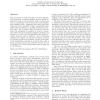Free Online Productivity Tools
i2Speak
i2Symbol
i2OCR
iTex2Img
iWeb2Print
iWeb2Shot
i2Type
iPdf2Split
iPdf2Merge
i2Bopomofo
i2Arabic
i2Style
i2Image
i2PDF
iLatex2Rtf
Sci2ools
112
click to vote
ACSC
2008
IEEE
2008
IEEE
Product flow analysis in distribution networks with a fixed time horizon
The movement of items through a product distribution network is a complex dynamic process which depends not only on the network’s static topology but also on a knowledge of how each node stores, handles and forwards items. Analysing this time-dependent behaviour would normally require a simulation algorithm which maintains a globally-synchronised system state. For a certain class of problem, however, where the simulation is required to stop in a consistent state but not necessarily maintain consistency at all times, we show that an algorithm that makes localised decisions only is sufficient. As a motivating example we consider the practical problem of product recalls, in which our primary concern is the state of the distribution network at a specific time after a batch of suspect items was released, but we do not necessarily care about intermediate states leading up to the final one.
ACSC 2008 | Computer Science | Distribution Network | Network’s Static Topology | Product Distribution Network |
| Added | 28 May 2010 |
| Updated | 28 May 2010 |
| Type | Conference |
| Year | 2008 |
| Where | ACSC |
| Authors | Moe Thandar Wynn, Colin J. Fidge, Arthur H. M. ter Hofstede, Marlon Dumas |
Comments (0)

